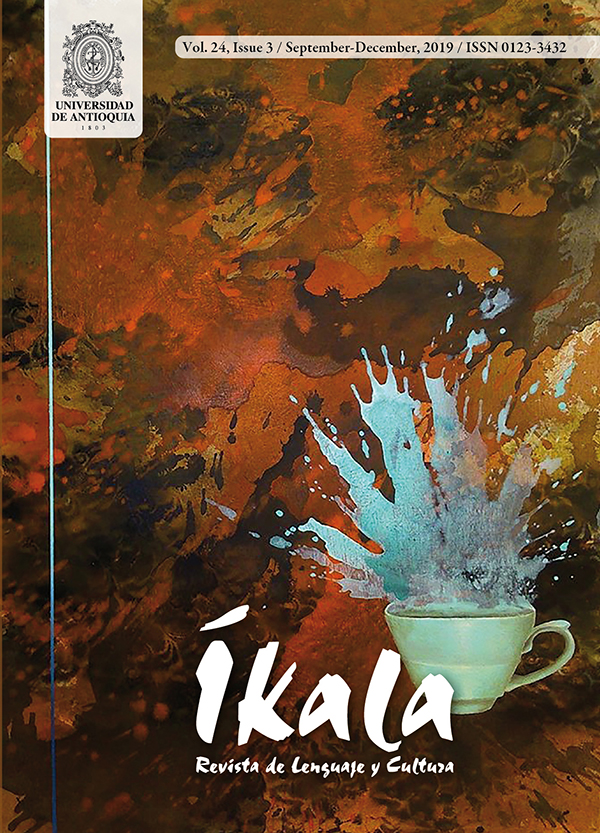Team-teaching as an Alternative Model for Practice-based English Language Teacher Education: A Case Study in Chile
DOI:
https://doi.org/10.17533/udea.ikala.v24n03a03Keywords:
preservice teacher education, practicum, team-teaching , English as a foreign language, teacher identity, professional developmentAbstract
In recent decades progressive teaching practices have become a global trend in English-as-a-Foreign-Language teachers’ initial training. Against this backdrop, there is some need to explore alternative models that allow the development of reflective and collaborative practices. This research project aims precisely at responding to this need and explores team teaching as an alternative approach in the contexts of initial teacher education. This case study examines a team-based teaching experience lived by a group of pre-service English teachers in Chile. This study’s findings reveal that the team teaching model promoted effective peer feedback, contributing to their professional development and the construction of their teachers’ identity. Finally, based on the results of the study, a discussion on the feasibility of implementing a teaching-based teaching system within the curriculum of initial teacher education is discussed.
Downloads
References
Aravena, F. (2013). Desarrollando el modelo colaborativo en la formación docente inicial: la autopercepción del desempeño profesional del practicante en acción. Estudios pedagógicos (Valdivia), 39(1), 25-44.
Baeten, M., & Simons, M. (2014). Student teachers' team teaching: Models, effects, and conditions for implementation. Teaching and Teacher Education, 41, 92-110. doi:http://dx.doi.org/10.1016/j.tate.2014.03.010
Baeten, M., & Simons, M. (2016). Student teachers´ team teaching: how do learners in the classroom experience team-taught lessons by student teachers? Journal of Education for Teaching: International Research and Pedagogy, 42(1), 93-105. doi:10.1080/02607476.2015.1135226
Dang, T.K. A. (2013). Identity in activity: Examining teacher professional identity formation in the paired-placement of student teachers. Teaching and Teacher Education, 30(0), 47-59. doi:http://dx.doi.org/10.1016/j.tate.2012.10.006
Díaz, C., & Bastías, C. (2012). Una aproximación a los patrones de comunicación entre el profesor mentor y el profesor-estudiante en el contexto de la práctica pedagógica. Educación XXI: Revista de la Facultad de Educación, 15(1), 241-263
Díaz, C., Alarcón, P., & Ortiz, M. (2015). A case study on EFL teachers’ beliefs about the teaching and learning of English in public education. Porta Linguarum, 23, 171- 186.
Glas, K. (2016). Opening up ‘spaces for manoeuvre’: English teacher perspectives on learner motivation. Research Papers in Education, 31(4), 442-461.
Heo, J., & Mann, S. J. (2015). Exploring team teaching and team teachers in Korean primary schools. English Language Teacher Education and Development, 17, 13-
Honigsfeld, A., & Dove, M. G. (2012). Coteaching and other collaborative practices in the EFL/ESL classroom : rationale, research, reflections, and recommendations. The United States of America: Information Age Publishing, Inc.
Johnson, K. E. (2009). Second language teacher education: a sociocultural perspective. New York: Routledge.
Johnson, K. E., & Golombek, P. R. (2016). Mindful L2 Teacher Education: A Sociocultural Perspective on Cultivating Teachers' Professional Development: Taylor & Francis.
Merriam, S. (2009). Qualitative research: a guide to design and implementation (Rev. & expanded ed.). San Francisco: Jossey-Bass
Ong’ondo, C., & Jwan, J. (2009). Research on student teacher learning, collaboration and supervision during the practicum: A literature review. Educational Research and Review, 4(11), 515-524.
Park, J.-E. (2014). English co-teaching and teacher collaboration: A micro-interactional perspective. System, 44, 34-44. doi:http://dx.doi.org/10.1016/j.system.2014.02.003
Saldana, J. (2012). The Coding Manual for Qualitative Researchers. London: SAGE Publications.
Rodríguez, F. (2014). La co-enseñanza, una estrategia para el mejoramiento educativo y la inclusión. . Revista latinoamericana de educación inclusiva, 8(2), 219-233.
Sorensen, P. (2014). Collaboration, dialogue and expansive learning: The use of paired and multiple placements in the school practicum. Teaching and Teacher Education, 44, 128-137. doi:http://dx.doi.org/10.1016/j.tate.2014.08.010
Yang, P. . 2013. "Two heads are better than one: Team teaching in TESOL internship." Studies About Languages 23:113-125.
Yang, P. (2014). One Stone, Two Birds: Maximizing Service Learning Outcomes through TESOL Practicum. English Language Teaching, 7(5), 120-127.
Zeichner, K. (2006). Reflections of a University-Based Teacher Educator on the Future of College- and University-Based Teacher Education. Journal of Teacher Education, 57(3), 326-340. doi:10.1177/0022487105285893
Downloads
Published
How to Cite
License
Copyright (c) 2019 Íkala

This work is licensed under a Creative Commons Attribution-NonCommercial-ShareAlike 4.0 International License.












